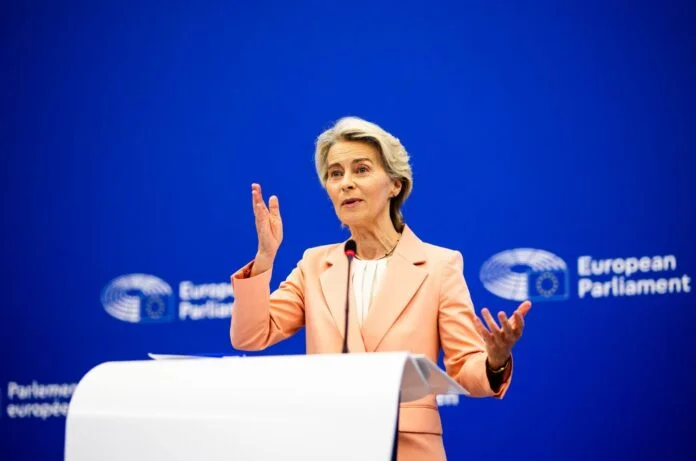By Agencies
The European Commission unveiled a proposal on Wednesday for a €2 trillion ($2.31 trillion) budget for the EU covering 2028 to 2034. This plan emphasizes economic competitiveness and defense while aiming to revamp traditional funding for agriculture and regional development.
“This budget aligns with Europe’s ambitions, addresses our challenges, and fortifies our independence,” Commission President Ursula von der Leyen stated to reporters in Brussels. “It’s larger, smarter, and sharper. It delivers for our citizens, businesses, partners, and future.”
The proposal represents 1.26% of the European Union’s Gross National Income (GNI), up from 1.13% in the current budget cycle. Most funding will come from member countries, but the Commission suggests new revenue sources, including a tax on companies with annual net turnovers exceeding €100 million in EU states.
This proposal marks the beginning of extensive negotiations before a final budget is approved by all member nations and the European Parliament. A highlight is the creation of a €451 billion European Competitiveness Fund aimed at enhancing Europe’s defense sector, fostering innovation, and transitioning industries to clean technologies.
Specifically, €131 billion is earmarked for defense and space, reflecting a fivefold increase from current allocations.
While the focus shifts towards new priorities, the proposal ensures substantial funding for farmers and less developed regions. It allocates €302 billion for agriculture and at least €218 billion for the EU’s least developed areas, alongside €200 billion for global initiatives. Additionally, the Commission has proposed dedicating €100 billion for Ukraine outside the main budget framework.
QUICK CRITICISM
Reactions to the proposal have been swift, with some EU countries and lawmakers expressing concerns. Dutch Finance Minister Eelco Heinen remarked, “The EU is vital for our prosperity, but this proposed budget is excessive.” Hungary’s Prime Minister Viktor Orban criticized what he termed “globalist bureaucrats” draining funds into Ukraine while neglecting local farmers.
“The Commission’s budget proposal is not only unfair; it’s unfit for negotiation,” he stated on X.
Conversely, the European Parliament argued the proposed budget is insufficient. Siegfried Muresan, a centre-right member and negotiator for the upcoming EU budget, emphasized, “We cannot achieve more with less. New priorities require adequate new resources, not cuts to existing ones.”
Budget discussions are notoriously challenging within EU politics, often revealing political and economic rifts among member states. Key topics likely to dominate this round include budget size, funding linked to political reforms, and overall EU expenditures.
Kata Tutto, president of the European Committee of the Regions, criticized the funding simplification proposals, describing them as “a MONSTER” threatening cohesion policy by nationalizing and centralizing resources. Farmers also protested in Brussels, with the influential European farmers’ group COPA-COGECA declaring it “Black Wednesday” for European agriculture.
($1 = €0.8645)

